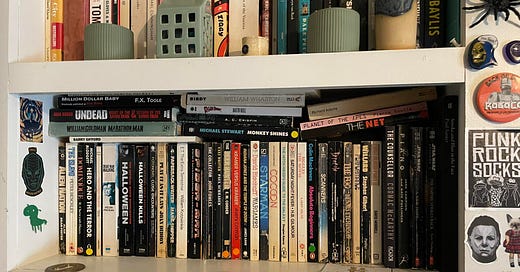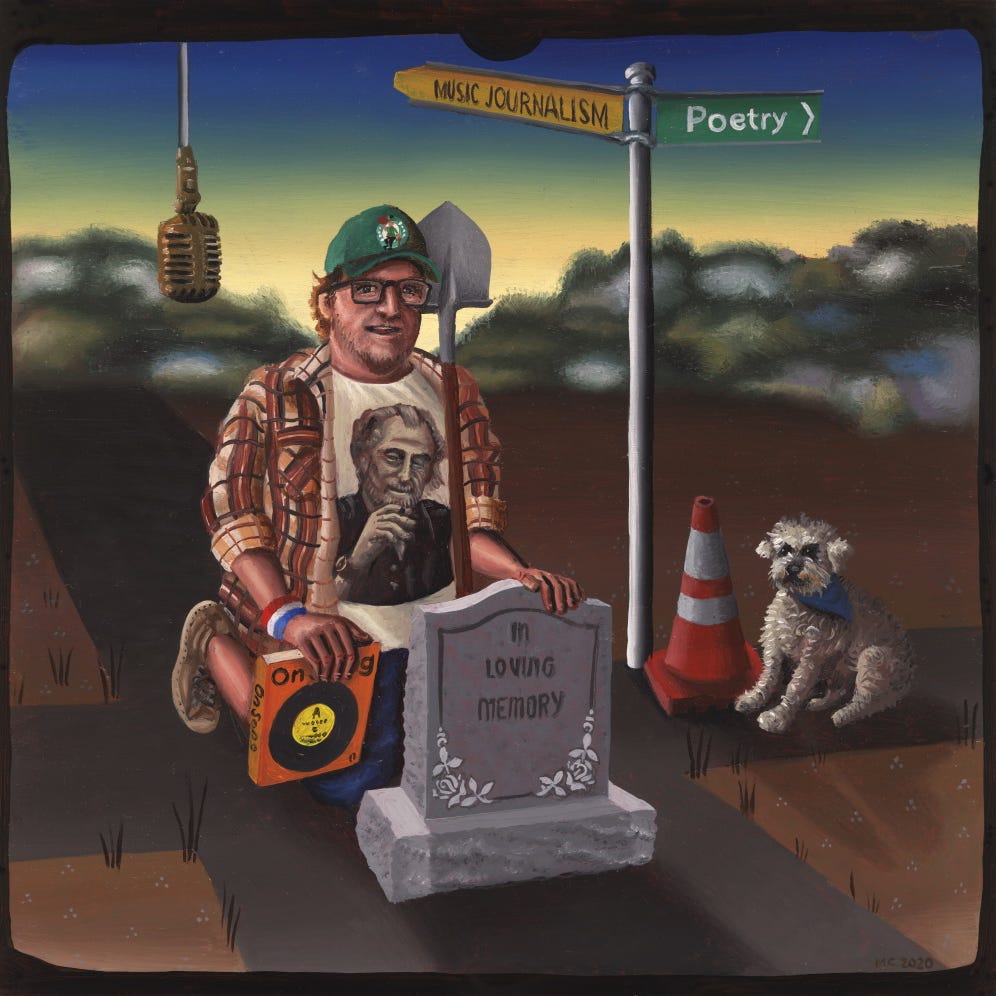Yes, You Can Totally Read The Book AFTER Seeing The Film, Right?!
Wednesday is about books. And writing. Today, reading the book AFTER the film. That's allowed, init?
To round off a week of leading with Killers of The Flower Moon - I am walking about the house carrying my copy of the book with me, in the hope I’ll find time and space and energy to start properly reading it. (I started it a few years ago, got distracted, regret not finishing it…)
It’s okay to read the book after seeing the film, right?
It used to seem like a golden no-no, or something. “Golden no-no” is a ridiculous term by the way, and I apologise. That sounds like a little thing that you and your dominatrix know about. It is a level above the safety-word…And now I apologise one more time. Erm, where were we…
There’s no need for justifications, but Killers of the Flower Moon is non-fiction, is journalism. Its film-version ignores the book’s big subtitle (“and the birth of the FBI”) to tell the story, in a different way and from the point of view of a side-character. So it’s going to offer a quite different experience.
But what about with fiction? I have finished a bunch of books over the years, in time to see the film. Only to sit through a watered-down version of the book I just read. Why is that the natural and correct order?
I’ve also had some pretty good experiences reading the book after the film. This year, for instance, I’ve finally read Stephen King’s Christine and, just this long weekend been, Firestarter. I doubt I’d have stuck with those early 80s classics (great, though they were) if I didn’t have the images from the films to help me along. Little storyline jogs. Little influencers of thought, helpful mental-image conjurers…
In the mid-1990s - for some reason - I broke code, and started buying and reading books after I had watched the movie. I had read Once Were Warriors because it was all but council-issued in Hawke’s Bay (we knew the author! Saw his grumpy face around town at least. And in my case, even had my band reviewed by him in a newspaper column - lol!) And then loved the movie as its own thing; the film’s director and the book’s writer in some dispute for some time. That only added to the drama, right? (It was always a bonus if the writer shat on the film version - I think that’s one of the reasons I love The Shining so much).
But then, I remember - and what a weird choice - I watched and loved Forrest Gump (I dare not go back, it would play out like a load of boomer-nonsense now I’m sure) and then bought the book it was based on after. I’m pretty sure this was the first example of this reverse-move. I also enjoyed the novel (at the time). And feel better about admitting that. And also have no desire to fact-check myself, to reevaulate on any level…
After that, I was all in for a bit. Culminating, I think - in the best example ever: I watched Catch Me If You Can on a flight over to Australia, then bought the book in the airport and read it cover to cover on the return flight. That’s an efficient turnaround. Even if it’s technically the wrong order.
I feel like the rule of thumb is that it’s absolutely and always going to be fine to read the non-fiction that inspires a movie after seeing the filmed iteration. But you might not get the same comfort from a novel. You are probably supposed to read the novel first, or, you know, decide to not bother and just go to the film.
But it can work out okay.
I loved Fight Club when I first saw it. A movie that I have flip-flopped on since, its influence somewhat problematic perhaps, though I think I escaped through a side-door there. It might have seemed an odd choice to go to the novel after, but I really enjoyed it and it got me into the work of Chuck Palahniuk for a time. So much so, I almost felt fully comfortable saying his surname aloud. (But it’s a slippery slope, soon you’re giving guest lectures on how to say the names of Tool albums. Be careful!)
In recent years I’ve become ever so slightly obsessed with the novelisation-world; that is to say the books that are written cheaply, quickly on the back of a film becoming a hit. There was no source material to begin with, this is a cash-in movie tie-in. A book appearing on the shelves with the watered down plot re-written and bound in a shrunken down version of the movie’s poster. I’m reading the original Star Wars trilogy as novelisations. They are wonderful examples of tight storytelling. The picture (in almost all senses) already in your mind.
Novelisations were big in the 1980s and I remember so many from my childhood. It’s a new way (back) in to some favourite films I guess. It also scratches my collector-itch. They’re (often) dirt cheap. And they feel so wonderfully nostaglic.
Other times I watch a film like David Fincher’s Gone Girl and I can see it being a great book - can just tell from the way the movie plays out that it would have been a fun read, but the movie gives me all I need. (Fincher’s Dragon Tattoo is probably the same for me).
In the case of Killers of the Flower Moon, I’m unashamedly fan-boying out (as you would know from my pre-post working through past Scorsese films and my gushing rave about seeing the film) but also the film has lit a fuse around wanting to know more. I have watched a few documentaries and read a few books about America’s history and history-of-racism around this time; I’m obsessed with the music from this era too - it’s all connected. So my desire to read this book isn’t just to make the film live on, and give myself a reason to see it again (like I need one!) It’s about a genuine reading experience. And adding to an area/era I’m already fascinated by.
I wonder if, other times, I’ve bought the book and read it after the film merely to keep it alive? And I wonder if there could ever be anything wrong with that ever? It’s certainly not hurting anyone at all, right?
Anyway, I sincerely wonder if you have rules around reading the book first - or if you have some great examples (fiction/non-fiction) of finding a great book, and/or a new favourite author because of seeing the film first?







Gone Girl is a good read. A light one but a good one. I quite enjoy Gillian Flynn. She also wrote Sharp Objects, have you seen it? And Dark Places which I’m not sure if they turned into a movie or not.
The interesting example is 2001: A Space Odyssey - based on Arthur C. Clarke’s “The Sentinel” short story but then novelised subsequently, also by Clarke. I can recommend the well-written novelisation because it actually tells you what’s going on the film, which - because I’m just a visual passenger - I didn’t quite parse the first, second or fifth time I saw it. That said, I’m terrified to watch the film they made of “The God of Small Things”.